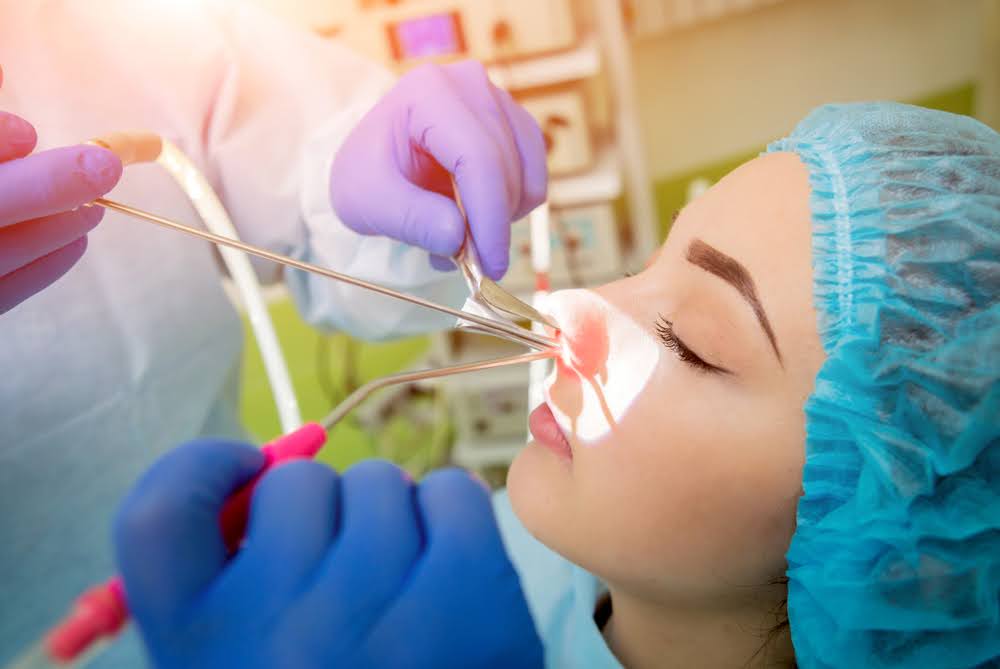Blog
Do Nasal Polyps Come Back After Sinus Surgery?

A common question from patients who have surgery to remove nasal polyps is whether or not their nasal polyps will grow back after the procedure. Dr. Shawn Allen, a Board-Certified Otolaryngologist (ENT) and fellowship-trained Rhinologist in Houston, is highly experienced in the successful treatment of nasal polyps. In this blog post, he explains how nasal polyps are treated.
What are nasal polyps?
Most nasal polyps are caused by abnormalities in the immune system combined with aggressive inflammation of the mucosal lining within the nose in response to allergies (dust mites, pet dander, pollens, etc.). They can occur at any age, and in nearly all cases are benign and cause only local obstruction-related symptoms such as nasal congestion, sinusitis, and smell loss. As they tend to grow slowly, they usually do not cause significant pain, pressure, or “sinus headaches.” When they are large, they might be visible just inside of the nostrils or even protrude from the nostrils at times. They often appear pale, and are not overly sensitive to touch compared to the normal mucosal lining within the nose. When more inflamed, some polyps are red and vascular (referred to as inflammatory polyps). These inflamed polyps may bleed when traumatized or cause nosebleeds when blowing your nose, sneezing, etc.
Treatment options for nasal polyps
Patients with an isolated polyp or several smaller polyps might respond well to medications such as oral and/or topical steroids to control the inflammation triggering the polyp growth, and in some cases this may resolve the polyps entirely. However, most patients with widespread nasal polyps require a combination of surgical and medical treatments to achieve good control of their symptoms, inflammation levels, and to control the growth of additional polyps within the nose long-term.
In these more severe cases, the role of surgery includes removal of polyps harboring extensive inflammatory cells that might otherwise impair controlling inflammation, as well as opening the nasal passages and sinuses enough to allow topical therapies (such as steroid nasal rinses and Xhance steroid nasal spray) to directly treat the areas where polyps tend to arise within the upper portions of the nose and out into the peripheral sinuses.
In most cases, this combination of appropriate surgery and ongoing topical steroids will prove successful at keeping nasal polyps from recurring. In cases where this ongoing topical steroid treatment alone is unsuccessful, there are additional treatments that might be needed such as allergy immunotherapy (shots or sublingual drops) or newer biologic medications such as Dupixent that directly control factors in the immune system throughout the body without the reliance on steroid pills (which carry a significant risk of side effects the more they are utilized).
Successful Nasal Polyp Removal
When the appropriate degree of sinus surgery is performed the first time, it is unlikely that revision sinus surgery will be needed as the openings should remain adequate to allow for this ongoing topical steroid therapy into the sinuses. Scarring that closes or narrows one or more sinuses might lead to a limited revision surgery in rare cases. Inadequate initial surgery, however, might result in the need for more extensive revision surgery to achieve these adequate openings into the sinuses. “Debulking” surgeries are also generally avoidable by maintaining control of the underlying disease and preventing polyps from growing out of control, usually by seeing the sinus specialist on a regular basis for endoscopic “check-up” visits that help determine if any changes to treatments are needed over time. These visits are spaced out according to the success of the treatments and the challenges posed by the individual’s disease.
To summarize, polyps are a symptom of underlying mucosal inflammation that is not regulated normally due to problems in the immune system. Adequate surgical and medical care can, in the vast majority of cases, control polyps and prevent the need for additional surgeries over time. A Fellowship-trained Rhinologist with added expertise and experience in managing tough polyp disease offers the best chances of success in providing the care needed to avoid ongoing nasal polyps and multiple sinus surgeries.
Contact Dr. Allen for Nasal Polyp Treatment in Houston, TX
Dr. Allen specializes in the diagnosis and treatment of nasal polyps, as well as sleep apnea and sinus conditions. He is dedicated to helping people find long-lasting relief from nasal and sinus issues. Contact us to schedule your appointment.